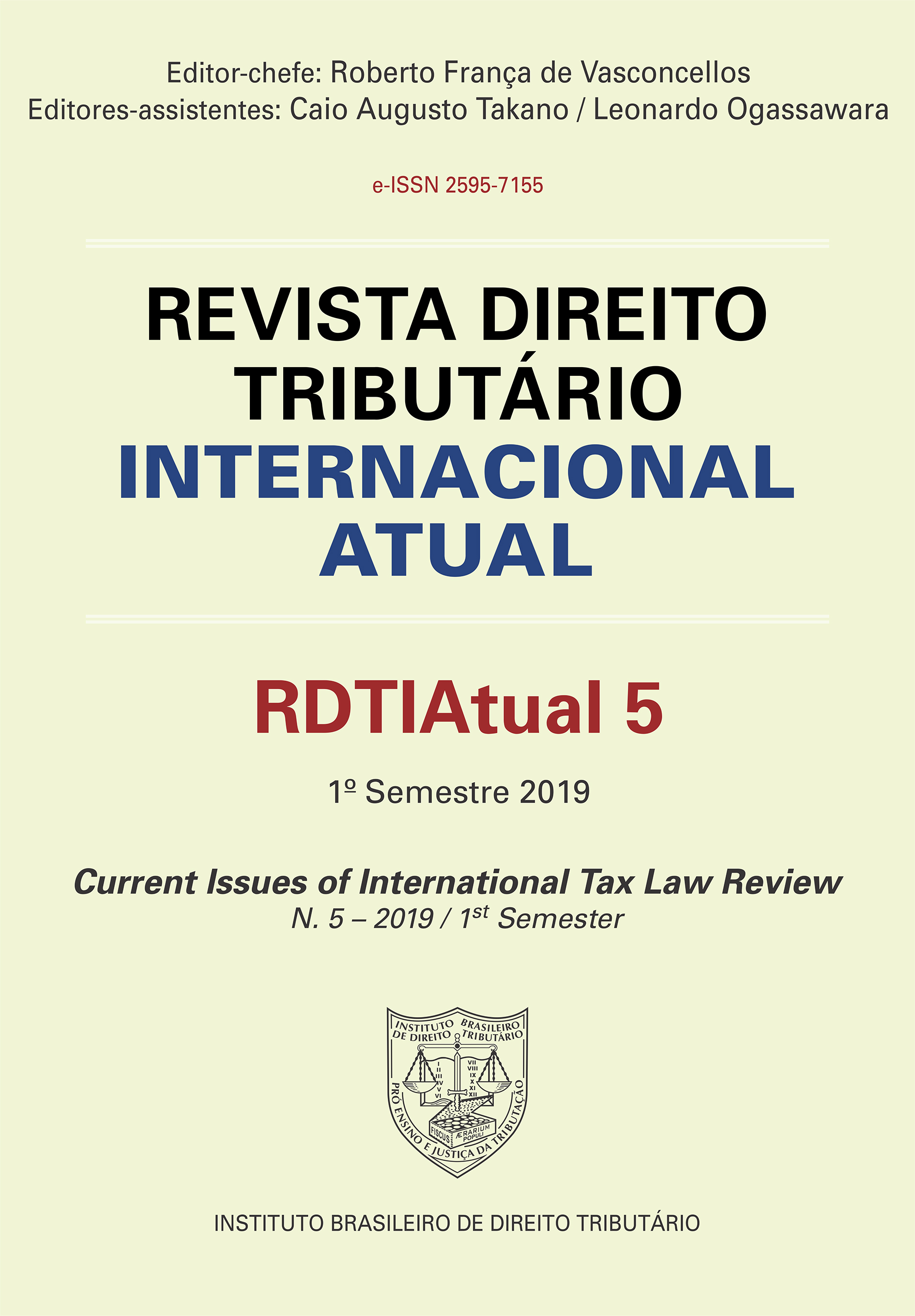Tax Havens: Fiscal Elision or Evasion?
An Analysis of this Strategy for Tax Planning in International Business Negotiations
DOI:
https://doi.org/10.46801/2595-7155-rdtia-n5-7Keywords:
fiscal evasion, tax heavens, tax planningAbstract
The theme addressed in this article is an analytical study of the international tax planning strategy known as the “Tax Havens” fictitious terminology, translated into Portuguese as “Tax Havens”, which concerns specific areas where they incur low or no taxation, constituted exclusively to this end. This research is relevant because of the expansion of the international companies that study the best legal regimes of taxation to allocate their headquarters and to establish branches in the face of the economic repercussion that the taxation has on commercial negotiations and capital flows. The research is also important to analyze the high and complex tax burden in Brazil on such negotiations involving companies. The problem theme that surrounds the research addresses the following question: what makes the strategy of tax havens a legal/illicit method of reducing the tax burden? The research is justified by the deconstruction of common sense about the illegality of this form of planning, notwithstanding recognizing the tax crimes committed in this panorama. The objective of the work is to verify the legitimacy and legality of this corporate strategy. The present article is a result of the development of the research, having as method of approach the deductive, and being a qualitative and descriptive research. The work follows the juridical-dogmatic aspect and the critical-methodological line. Bibliography and research elements included by scientific articles, national and international doctrines, as well as analysis of legal diplomas were used. The results obtained in the research demonstrate that tax havens are a licit strategy, although they are constantly used for different purposes.
References
ANTÓN, Fernando Serrano. El principio de territorialidad en el impuesto sobre la renta en la escuela latinoamericana. In: TÔRRES, Heleno Taveira (coord.). Direito tributário internacional aplicado. São Paulo: Quartier Latin, 2005. v. III.
APARECIDO, M. H. Planejamento tributário: elisão versus evasão fiscal e a utilização dos paraísos fiscais. CONPEDI, 2018. Disponível em: <https://marsantos.jusbrasil.com.br/artigos/485493228/planejamento-tributario-elisao-versus-evasao-fiscal-e-a-utilizacao-dos-paraisos-fiscais?ref=topic_feed>. Acesso em: 2 jan. 2019.
ARGÔLO, A. T.; e IGLESIAS, M. B. A constituição de empresas offshore como estratégia de planejamento tributário e a evasão de divisas. Seminário Internacional Demandas Sociais e Políticas Públicas na Sociedade Contemporânea, nº 1192612034, Santa Cruz do Sul/RS, 2018. Anais eletrônicos: ISSN 2358 – 3010, Santa Cruz do Sul/RS, 2018. 15º v.
BECKER, Alfredo Augusto. Teoria geral do direito tributário. São Paulo: Lejus, 1999.
BRASIL. Constituição Federal. Constituição da República Federativa do Brasil. Brasília, DF: Senado Federal: Centro Gráfico, 1988. Disponível em: . Acesso em: 9 dez. 2018.
______. Instrução Normativa n. 1.037, de 4 de junho de 2010. Relaciona países ou dependências com tributação favorecida e regimes fiscais privilegiados. Disponível em: . Acesso em: 14 dez. 2018.
______. Instrução Normativa RFB n. 1.474, de 18 de junho de 2014. Altera a Instrução Normativa RFB n. 1.037, de 4 de junho de 2010, que relaciona países ou dependências com tributação favorecida e regimes fiscais privilegiados. Disponível em: . Acesso em: 14 dez. 2018.
______. Código Tributário Nacional. Lei n. 5.172/1966. Código Tributário Nacional. Disponível em: . Acesso em: 14 dez. 2018.
______. Lei n. 8.137, de 27 de dezembro de 1990. Crimes contra a ordem Tributária. Disponível em: . Acesso em: 14 dez. 2018.
______. PL n. 273, de 24 de março de 1983. Dos crimes contra o Sistema Financeiro Nacional e outras providências. Disponível em: . Acesso em: 15 dez. 2018.
______. Lei n. 7.492, de 16 de junho de 1986. Crimes contra o sistema Financeiro Nacional. Disponível em: . Acesso em: 14 maio 2018.
______. Lei n. 13.254, de 13 de janeiro de 2016. Lei da Repatriação. Disponível em: . Acesso em: 14 dez. 2018.
BUFFON, Marciano. Tributação no Brasil no século XXI: uma abordagem hermenêutica crítica. Porto alegre: Livraria do Advogado, 2015.
CARVALHO, Paulo de Barros. Curso de direito tributário. 28. ed. São Paulo: Saraiva, 2017.
DÓRIA, Antônio Roberto Sampaio. Elisão e evasão fiscal. 1. ed. São Paulo: Livraria do Advogado, 1971.
FALCÃO, Joaquim; GUERRA, Sergio; e ALMEIDA, Rafael (org.). Tributação internacional e planejamento tributário. Rio de Janeiro: FGV, 2016. 88 p. (Direito Tributário (FGV Management)).
GOYOS JR., Durval de Noronha. Paraísos fiscais: planejamento tributário internacional. São Paulo: Observador Legal ed. LTDA, 1988.
HUCK, Hermes Marcelo. Evasão e elisão: rotas nacionais e internacionais do planejamento tributário. São Paulo: Saraiva, 1997.
MAMEDE, Gladston. Direito empresarial brasileiro: direito societário: sociedades simples e empresárias. 4. ed. São Paulo: Atlas, 2010. v. 2.
______; e MAMEDE, Eduarda Cotta. Blindagem patrimonial e planejamento jurídico. 5. ed. São Paulo: Atlas, 2015.
PENTEADO, Claudio Camargo. Empresas offshore: Uruguai, Cayman, Ilhas Virgens Britânicas. São Paulo: Pillares, 2001.
SCHOUERI, Luís Eduardo. O desafio do planejamento tributário. In: SCHOUERI, L. E. (coord.); e FREITAS, Rodrigo de (org.). Planejamento tributário e o “propósito negocial”. São Paulo: Quartier Latin, 2010.
______. Direito tributário. 7. ed. São Paulo: Saraiva, 2017.
SILVA, Rubens Fonseca e; e WILLIAMS, Robert E. Tratados dos paraísos fiscais. São Paulo: Observador Legal, 1998.
VENOSA, Silvio de Salvo; e RODRIGUES, Cláudia. Direito civil. 3. ed. São Paulo: Atlas, 2012. v. 8 – Direito Empresarial.
XAVIER, A. Direito tributário internacional do Brasil. Rio de Janeiro: Atual, 2009.
Published
How to Cite
Issue
Section
License

This work is licensed under a Creative Commons Attribution-NonCommercial-ShareAlike 4.0 International License.
O autor (ou coautor) declara que o artigo submetido à avaliação, que segue em anexo, é de sua autoria, e inédito, comprometendo-se a não publicar este artigo em qualquer outro meio, impresso ou digital, mantendo a exclusividade para a Revista Direito Tributário Internacional Atual, cedendo, em caso de aprovação do trabalho, os direitos autorais à Revista para fins de publicação do trabalho nesta edição.





